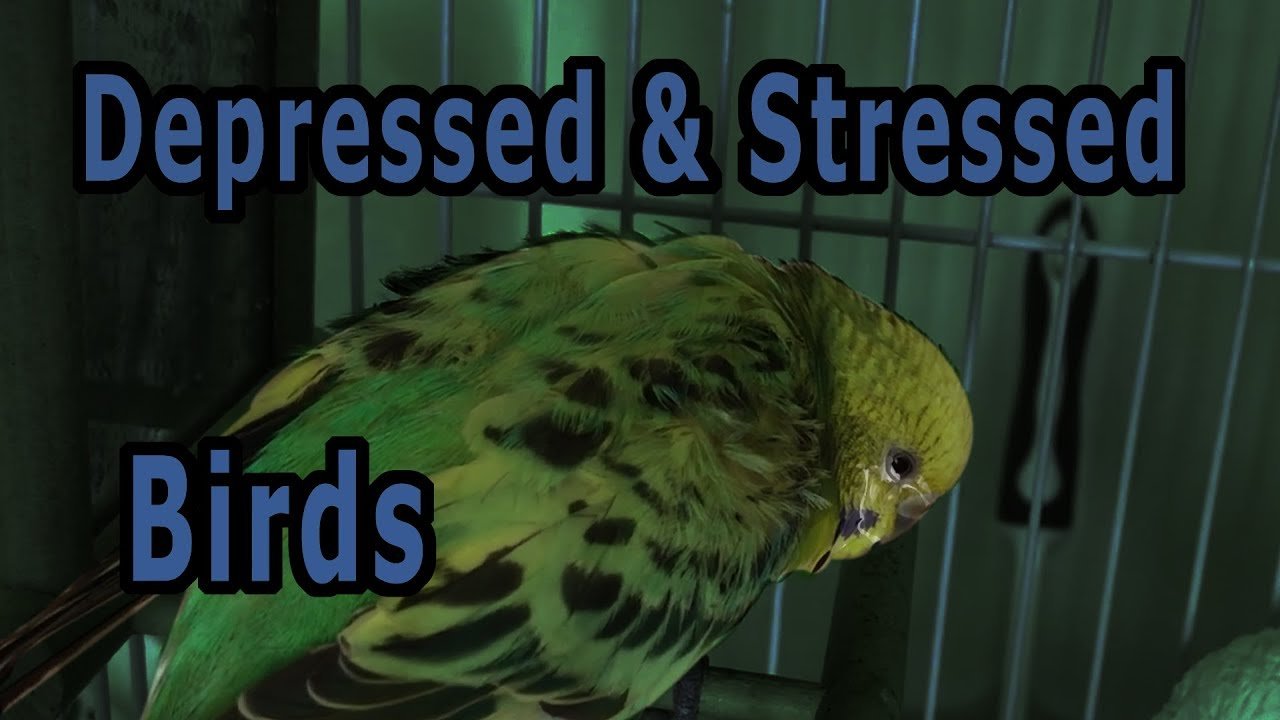Is your bird depressed? Look out for signs such as decreased appetite, feather picking, decreased vocalization, lethargy, aggression, biting, loss of interest in toys, stress bars, and self-harm.
These indicators may suggest that your bird is experiencing emotional distress. However, it can be challenging to determine if a bird is depressed, as they may not exhibit clear signs. Changes in eating or sleeping patterns, decreased vocalization, decreased activity, and feather plucking are potential indicators of bird depression.
Understanding these signs can help you better care for your bird’s emotional well-being.

Understanding Bird Depression
It can be challenging to determine if a bird is experiencing depression, as they may not exhibit clear signs of emotional distress. However, being aware of the potential indicators can help bird owners identify and address this issue. Some common signs of bird depression include a lack of appetite, feather plucking, decreased vocalization, and lethargy. By paying attention to these behaviors, you can provide the necessary care and support to help your feathered friend.
Lack Of Appetite
A significant change in a bird’s eating patterns can be an indication of depression. If your bird suddenly loses interest in food or has a decreased appetite, it could be a red flag. Additionally, watch out for changes in water consumption. Make sure to provide a balanced diet and consult with an avian veterinarian to rule out any underlying health issues.
Feather Plucking
Feather plucking is a common behavior exhibited by birds experiencing depression. This is when a bird persistently pulls out its own feathers, leading to bald spots and skin damage. Feather plucking can also be a symptom of other health conditions, so it’s important to seek professional advice to determine the underlying cause.
Decreased Vocalization
Birds are known for their vocalization, and a sudden decrease in their communication can be a sign of depression. If your bird becomes unusually quiet and lacks their usual chirping or talking, it may indicate a change in their emotional well-being. However, it’s essential to rule out any potential health issues that could affect their vocal abilities.
Lethargy And Decreased Activity
Depressed birds often exhibit lethargy and a decrease in overall activity levels. If your bird appears unusually tired, uninterested, or spends most of its time sitting still, it may be a sign of distress. To promote mental and physical stimulation, provide engaging toys, encourage exercise, and create an enriching environment for your bird.
In conclusion, understanding bird depression is crucial for bird owners in order to support their emotional well-being. By recognizing signs such as lack of appetite, feather plucking, decreased vocalization, and lethargy, you can take appropriate measures to help your bird overcome their depression and improve their quality of life.
Causes Of Bird Depression
Bird depression can be difficult to identify, but some signs may include changes in eating or sleeping patterns, decreased vocalization, decreased activity, and feather plucking. These indicators can help determine if a bird is experiencing emotional distress.
Birds, like humans, can experience emotions such as happiness and sadness. When a bird is feeling down, it may exhibit signs of depression. Understanding the causes of bird depression is essential to providing the necessary care and support to help your feathered friend recover. Here are some common causes of bird depression:
Loneliness And Boredom
Birds are social creatures and thrive on companionship. When they are deprived of social interaction and mental stimulation, they can become lonely and bored. This can lead to feelings of sadness and depression. If your bird spends too much time alone in its cage without any social interaction or toys to keep it occupied, it may start exhibiting signs of depression.
Loss Of A Companion
Birds form strong bonds with their companions, whether they are another bird or their human caretaker. The loss of a companion, through death or separation, can be a significant cause of bird depression. Just like humans mourn the loss of a loved one, birds can also experience grief and sadness when they lose someone they are close to.
Environmental Stressors
The environment plays a crucial role in a bird’s mental well-being. Factors such as a noisy household, constant exposure to loud music or TV, or sudden changes can create stress for a bird. These environmental stressors can contribute to bird depression. It’s important to create a calm and peaceful environment for your bird, providing a sense of security and comfort.
Lack Of Mental Stimulation
Birds are intelligent creatures that require mental stimulation to keep their minds active and engaged. Without enough mental stimulation, birds can become bored and frustrated, leading to feelings of depression. Providing your bird with toys, puzzles, and interactive activities can help prevent boredom and stimulate their mental faculties.
Addressing Bird Depression
Determining if a bird is depressed can be challenging, as they may not exhibit clear signs of emotional distress. However, potential indicators include changes in eating or sleeping patterns, decreased vocalization, decreased activity, and feather plucking.
Seeking Veterinary Advice
If you suspect that your bird is depressed, it is essential to seek veterinary advice to rule out any underlying medical conditions. A qualified avian veterinarian will be able to conduct a thorough examination and provide a proper diagnosis. They may also recommend specific tests or treatments to address any physical ailments that could be contributing to your bird’s depression.
Increasing Social Interaction
Social interaction plays a crucial role in the mental well-being of birds. Birds are highly social creatures, and a lack of social stimulation can lead to feelings of loneliness and depression. To address bird depression, it is important to increase social interaction with your feathered friend. Spend quality time each day talking to your bird, playing games, or engaging in interactive activities. Consider getting a companion bird if appropriate, as this can provide much-needed companionship for your bird.
Providing Mental Enrichment
Providing mental enrichment is vital to combating bird depression. Birds are intelligent creatures that require mental stimulation to thrive. Incorporate activities that challenge your bird’s cognitive abilities, such as puzzle toys, foraging toys, or training sessions. Offer a variety of toys that encourage play and exploration. Rotate the toys regularly to keep your bird engaged and prevent boredom. Additionally, providing opportunities for your bird to explore their natural behaviors, such as flight and foraging, can greatly contribute to their mental well-being.
Creating A Stimulating Environment
A stimulating environment is crucial for addressing bird depression. Birds thrive in an environment that mimics their natural habitat and provides opportunities for exploration and physical activity. Ensure that your bird’s cage is spacious and equipped with perches, toys, and natural branches for climbing. Offer a variety of textures and materials for your bird to chew on, such as safe wood or bird-friendly ropes. Create different levels within the cage to encourage movement and exercise. Additionally, provide exposure to natural sunlight, fresh air, and a quiet space for your bird to retreat to when needed.
:strip_icc()/close-up-of-parrot-perching-on-cage-769780193-5b50046cc9e77c005bff80d7.jpg)
:strip_icc()/parrot-in-cage--close-up-200522380-001-5b553bf146e0fb0037fdfb5e.jpg)
Frequently Asked Questions On Signs That Your Bird Is Depressed
How Do I Know If My Bird Is Depressed?
It can be difficult to determine if your bird is depressed, but some potential indicators may include changes in eating or sleeping patterns, decreased vocalization, decreased activity, and feather plucking.
How Do Birds Show They Are Sad?
Birds may show they are sad through decreased appetite, feather picking, decreased vocalization, lethargy, aggression, biting, loss of interest in toys, stress bars, and self-harm.
Are Caged Birds Depressed?
Caged birds can become depressed, showing signs such as decreased appetite, feather picking, lethargy, aggression, biting, loss of interest in toys, and self-harm. However, it can be challenging to determine if a bird is genuinely depressed as they might not exhibit clear signs of emotional distress.
How Can You Tell If A Bird Is In Distress?
Signs of bird distress include decreased appetite, feather picking, decreased vocalization, lethargy, aggression, biting, loss of interest in toys, stress bars, and self-harm.
Conclusion
It can be difficult to identify if a bird is experiencing depression, as they may not display obvious signs of emotional distress. However, there are some potential indicators to look out for, such as changes in eating or sleeping patterns, decreased vocalization, decreased activity, and feather plucking.
If you notice any of these signs in your bird, it is important to consult with a veterinarian who specializes in avian health to ensure their well-being.


